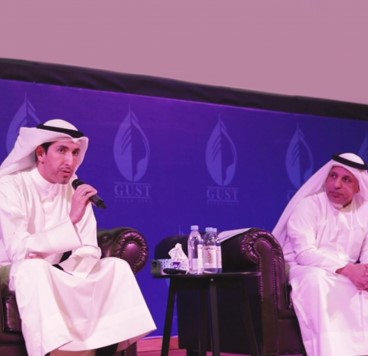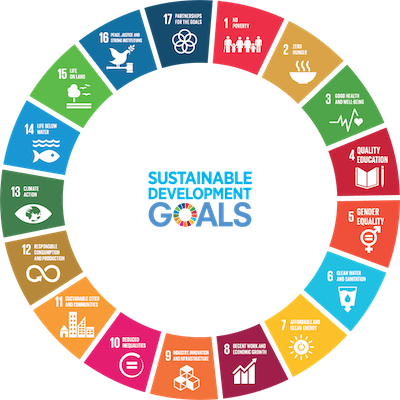SDG12: Responsible Consumption & Production

Economic and social progress over the last century has caused environmental degradation that is endangering ecosystems and the future of the world. One component of the social and economic progress is the increasing worldwide consumption and production of all resources for the global economy, which rely on the use of the natural environment and resources in ways that continue to have negative impacts on the planet. According to the United Nations Department of Economic and Social Affairs (2019), the global population could grow to approximately 9.7 billion in 2050. The equivalent of almost three planets could be required to provide the natural resources needed to sustain current lifestyles.
Changes in consumption and production patterns can help to promote the decoupling of economic growth and human well-being from resource use and environmental impact. They can also trigger the transformations envisaged in global commitments on biodiversity, the climate, and sustainable development in general. However, it is one of the most critical and complex challenges facing humanity today. Urgent action is needed to ensure that current material needs do not lead to the over-extraction of resources to the degradation of environmental resources. It would also require policies that create a conducive environment for changes in social and physical infrastructure and markets, transformations in business practices along global value chains, and major shifts in consumer behaviour and lifestyle.
By 2019, 79 countries and the European Union have reported on at least one national policy instrument to promote sustainable consumption and production patterns. This was done to work towards the implementation of the "10-Year Framework of Programmes on Sustainable Consumption and Production Patterns". Global fossil fuel subsidies in 2018 were $400 billion. This was double the estimated subsidies for renewables and is detrimental to the task of reducing global carbon dioxide emissions.
Improve human health and reduce adverse effects on the environment by promoting sustainable management of natural resources, reducing food and other solid waste, better managing of chemicals and fertilizers, and improving reporting and procurement practices.
SEED Hosts First Seminar "Are we heading toward changes in water and electricity prices in Kuwait"

The Center for Sustainable Energy and Economic Development (SEED) at Gulf University for Science and Technology (GUST) hosted its first seminar of the 2021/22 academic year titled "Are we heading toward changes in water and electricity prices in Kuwait?". The two key speakers of the seminar were Instructor of Economics and Finance, Dr. Osama Al-Falah and Senior Analyst at Al-Khafji Joint Operations, Mr. Mohammad Ramadhan, who tackled a various questions regarding Kuwait's economic future with water and electricity.
Both speakers tackled topics such as why should Kuwait increase its water and electricity prices and how does it compare geographically in the region? This seminar was organized in coordination with the Economics Club, as a part of their "Sustainability Week" shedding light on energy and sustainability.
Bayan Club Shows the Other Side of Business

The Bayan Cultural Club held an online discussion with AH store on March 10 under the title of "The Other Side of Products". The interview was held on Instagram live and discussed the incorporation of current trends into clothing products. The talk also discussed entrepreneurship and was targeted at students who are interested in starting their own business in the future.
GUST for SDGs specific researches on sustainability
- Ouakouak, Mohammed Laid, Bindu Arya, and Michel Zaitouni. "Corporate social responsibility and intention to quit: Mediating role of organizational citizenship behavior." International Journal of Productivity and Performance Management (2019)
- Vargas-Berrones, Karla Ximena, Roberto Sarmiento, and Garvan Whelan. "Can you have your cake and eat it? Investigating trade-offs in the implementation of green initiatives." Production Planning & Control 31.11-12 (2020): 845-860
- Agag, Gomaa, et al. "Decoding travellers' willingness to pay more for green travel products: Closing the intention-behaviour gap." Journal of Sustainable Tourism 28.10 (2020): 1551-1575
- Mostafa, Mohamed M. "Who eats "frankenfoods" in Egypt? A structural equation analysis." Journal of International Food & Agribusiness Marketing 33.3 (2021): 321-351
- Alnajem, Mohamad, Mohamed M. Mostafa, and Ahmed R. ElMelegy. "Mapping the first decade of circular economy research: A bibliometric network analysis." Journal of Industrial and Production Engineering 38.1 (2021): 29-50
- Arda, Ozlem Ayaz, et al. "Toward a holistic understanding of sustainability in corporations: Resource-based view of sustainable supply chain management." Supply Chain Management: An International Journal (2021)
- Atif, Muhammad, et al. "Does board gender diversity affect renewable energy consumption?." Journal of Corporate Finance 66 (2021): 101665
- Alwasmi, Mohammad, and Ahmad Alderbas. "Should Corporate Social Responsibility Around The World be Mandatory or Voluntary?." Comparative Law Review 27 (2021): 169-193
- Ye, Jianhua, et al. "The nexus among green financial development and renewable energy: investment in the wake of the Covid-19 pandemic." Economic Research-Ekonomska Istraživanja (2022): 1-26
- Rejeb, Abderahman, et al. "Tracing knowledge evolution flows in scholarly restaurant research: a main path analysis." Quality & quantity (2022): 1-27
- Yilmaz, Mustafa K., et al. "Measuring the impact of board gender and cultural diversity on corporate governance and social performance: evidence from emerging markets." Economic Research-Ekonomska Istraživanja (2022): 1-35
- Hamed, Ruba Subhi, et al. "The impact of introducing new regulations on the quality of CSR reporting: Evidence from the UK." Journal of International Accounting, Auditing and Taxation 46 (2022): 100444
- Park, Kathleen, and Frederick Wallace. "Multicultural leaders from emerging markets: transforming international acquisitions and corporate social responsibility." International Journal of Emerging Markets (2021)
- Hmiden, Oussama Ben, Hatem Rjiba, and Samir Saadi. "Competition through environmental CSR engagement and cost of equity capital." Finance Research Letters (2022): 102773
- Park, ChangYeon, et al. "Volunteer tourists' environmentally friendly behavior and support for sustainable tourism development using Value-Belief-Norm theory: Moderating role of altruism." Journal of Destination Marketing & Management 25 (2022): 100712
- Hossain, Ashrafee, Hatem Rjiba, and Samir Saadi. "Judge Ideology and Corporate Sexual Orientation Equality." Finance Research Letters 49 (2022): 103108
Education for SDGs specific courses on sustainability
Have dedicated courses (full degrees, or electives) that address sustainability and the SDGs.Courses Related To SDGs
CAS = Collage of Arts and Sciences, CBA = Collage of Business Administration
| SDG | Collage | Course |
|---|---|---|
| SDG 12 - Responsible Consumption & Production | CAS | BIOL 103 Environmental Biology 3.00 Prerequisite: ENGL 098/100/110/112 & non CS Examines the organization of natural ecosystem as it relates to the human community. Basic ecological principles are applied to current environmental issues. Among the topics to be examined are past and present uses and abuses of natural resources; environmental ethics and public policy; global environmental problems; human population growth; pollution; waste disposal; habitat loss; species extinction; and strategies for attaining a sustainable earth |
| SDG 12 - Responsible Consumption & Production | CBA | MGMT 201 Introduction to Management Topics: social responsibility of organizations. This course examines a wide range of business theory and practical applications related to effective management practices. In addition to learning about what management is and what managers do, learners will also explore and assess their own management styles and the implications of their findings. Learners apply critical thinking skills pertaining to core business functions. Focus is on contributing factors to management, such as communication, the role of the manager, design of the organization, ethical issues, social responsibility and globalization. The course format emphasizes the application of management roles and competencies through experiential activities, group exercises and case analysis. |
| SDG 12 - Responsible Consumption & Production | CBA | MGMT 324 Quality Assurance in Business Topics: ethical practices in Operations. A study of statistical quality control concepts and procedures applicable to management systems, administrative activities, service industries, and nonprofit organizations. Some successful quality assurance programs will be examined. |
| SDG 12 - Responsible Consumption & Production | CBA | MGMT 422 Lean Production in Manufacturing & Service Operations Topics: - Zero Waste. This course is a study of Lean Production philosophy and techniques in manufacturing and service operations. Topics include process analysis and continuous improvement techniques, quick set-ups, total productive maintenance, kanban scheduling, cellular production, team organization of workers, supplier relations, quality management, and the environmental aspects of production. |
| SDG 12 - Responsible Consumption & Production | CBA | MGMT 471 Role of the Global Corporation Topics: ethics and social responsibility of global organizations. The purpose of this course is to create awareness of controversial issues about international business. Students will gain a better understanding of resistance to, and criticism of, international business and will become better prepared for dealing with these issues and problems. |
| SDG 12 - Responsible Consumption & Production | CBA | MGMT 521 Operations Management Topics: ethical practices in Operations. This subject deals with the creation and delivery of goods and services. Topics include the design of production processes, the layout and location of production facilities, forecasting, scheduling, inventory control, queuing, material acquisition planning, and quality control. Analytical techniques are used to solve management problems. |
| SDG 12 - Responsible Consumption & Production | CBA | MGMT 571 International Business Topics: ethics and social responsibility of International organizations. This is a fundamental international business course aiming at introducing students to the general business environment that impacts conducting business across borders. Topics covered to include: Overview of International Business & Globalization, Culture, Government and Legal Systems, Trade & Factor Mobility Theory, Trade Protectionism, Economic Integration and Cooperation, Ethics & Social Responsibility, Strategies for International Business, Modes of Trading Internationally, and Forms and Ownership of Foreign Production |
| SDG 12 - Responsible Consumption & Production | CBA | MRKT 330 Consumer Behavior Topics: environmental, ethical, multicultural and social influences A study of such consumer functions as decision making, attitude formation and change, cognition, perception, and learning. The marketing concepts of product positioning, segmentation, brand loyalty, shopping preference and diffusion of innovations are considered in context with the environmental, ethical, multicultural and social influences on increasingly diverse global consumers. |
| SDG 12 - Responsible Consumption & Production | CBA | MRKT 460 International Marketing Topics: environmental, ethical, multicultural and social influences Marketing management problems, techniques and strategies needed to apply the marketing concept to the world marketplace. Understanding a country's cultural and environmental impact on the marketing plan is emphasized, as well as competing in markets of various cultures. Worldwide consumerism, economic and social development, the spread of multinational corporations, business ethics, and current economic and marketing issues are examined. |
| SDG 12 - Responsible Consumption & Production | CBA | MRKT 505 Contemporary Marketing Concepts Topics: impact of marketing on society Designed for students with no prior course work in the field of marketing. A wide spectrum of marketing institutions and activities is covered. The impact of marketing on the total firm, the economy, and society in general is assessed. The course is intended to develop and organize the fundamental marketing concepts necessary to an analytical study of consumer behavior, the economic environment, and four managerial aspects of marketing. The acquisition and utilization of marketing research data for problem solving is stressed. Relation and integration of basic marketing knowledge to the successful development of sound marketing policy, planning, and strategy is developed |

 Main Page
Main Page Download PDF
Download PDF